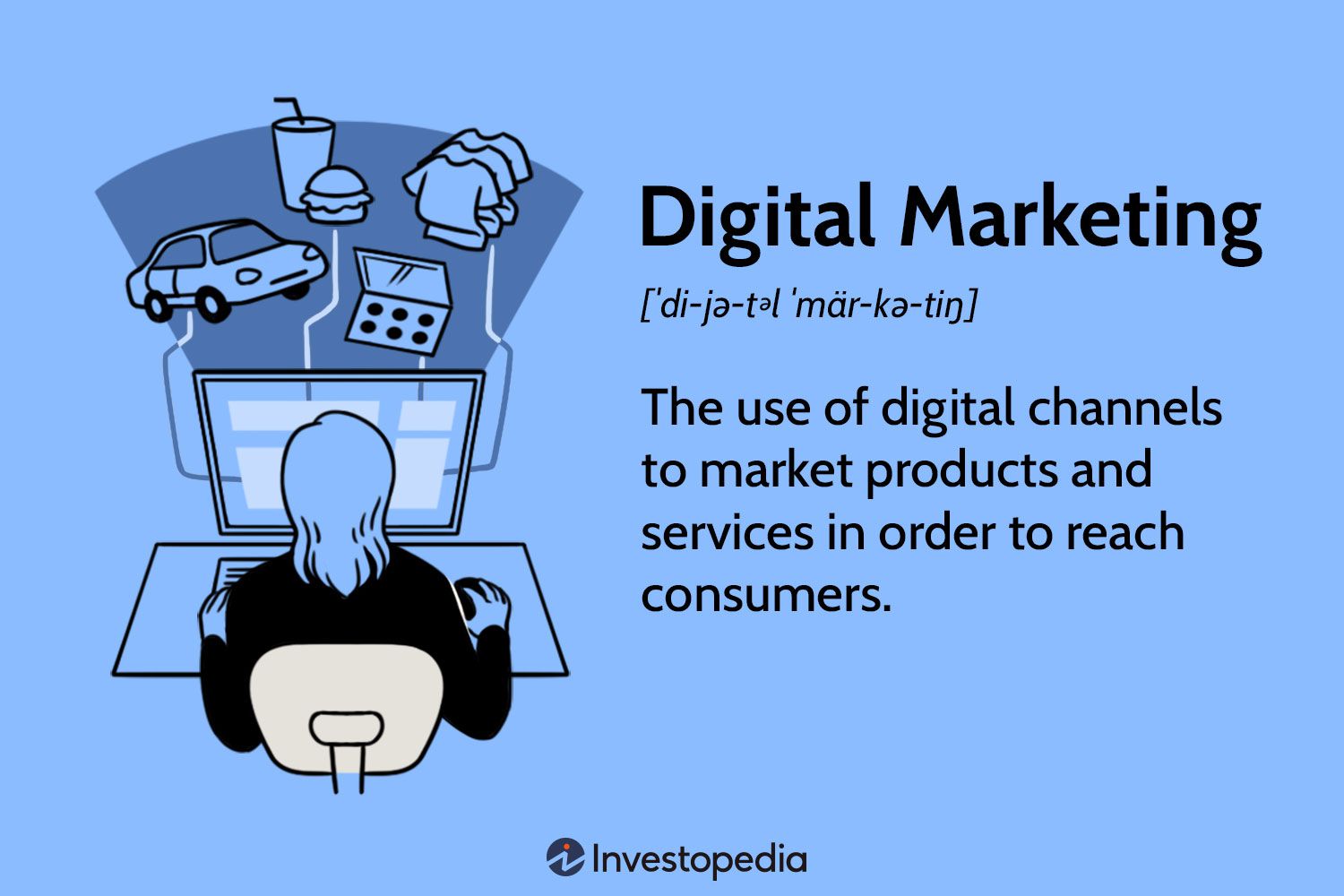Digital marketing is an ever-evolving field, and it’s crucial to keep up with its rapidly changing landscape. But what exactly is digital marketing? If you find yourself wondering about this fundamental question, don’t worry – we’ve got you covered! In this blog post, we will explore the nuances of digital marketing and unpack the essential concepts to help you gain a better understanding.
Digital marketing refers to the promotion of brands, products, or services using digital technologies and channels, such as websites, social media, email, and mobile apps. It encompasses a wide range of online activities aimed at reaching the target audience through an array of devices, including computers, smartphones, and tablets. With digital marketing’s inclusivity and versatility, it has become a critical part of any successful marketing strategy in today’s internet-driven world.
But wait – there’s more to it! If you’re interested in exploring digital marketing further – from understanding the difference between inbound marketing and digital marketing, to learning about various digital marketing strategies – then keep on reading. Dive into the world of digital marketing with us and discover how it can bring life to your brand and accelerate your business growth.
Understanding Digital Marketing
Definition and Scope of Digital Marketing
In the simplest terms, digital marketing can be defined as the application of marketing strategies implemented through digital media and channels. It involves using the internet and digital technology, along with various online platforms, such as social media, email marketing, search engines, display advertising, and mobile apps to connect with current and potential customers.
Unlike traditional marketing practices, which rely on physical interactions and tangible mediums, digital marketing promotes engagement and conversations through digital resources. It seeks to optimize the benefits of the immense interconnectivity provided by the internet. Therefore, it encompasses a wide range of online activities, strategically designed to boost brand awareness, drive traffic, generate leads, and improve sales.
Digital marketing doesn’t solely depend on the internet; it also consists of non-internet digital channels such as text messaging (SMS and MMS), call-back, and on-hold mobile ring tones. Nevertheless, the real beauty of this marketing paradigm lies in its inclusivity, as it enables marketers to reach out to audiences through various devices such as computers, smartphones, smart TVs, and tablets. With the proliferation of such gadgets, the impact and relevance of digital marketing have skyrocketed.

Source: Investopedia
Inbound Marketing vs. Digital Marketing
While the terms ‘digital marketing’ and ‘inbound marketing’ are often used interchangeably, they each have distinct characteristics and scopes. Inbound marketing is a whole marketing methodology that desires to attract customers by creating valuable content and experiences tailored to them. It pulls customers towards products and services using a mix of marketing channels such as SEO, blogs, content marketing, events, social media, and more.
On the other hand, digital marketing, as we discussed, is the marketing of products or services via digital channels. Although inbound marketing techniques are enacted predominantly via digital means and platforms, not all digital marketing is inbound. Some digital marketing strategies, like PPC (Pay Per Click) advertising or traditional display advertising, push messages onto the consumer rather than attracting them with value.
Therefore, it can be said that inbound marketing is a constituent of the broader category known as digital marketing. While digital marketing relates to all the tactics utilized on digital platforms, inbound marketing is more about a strategic methodology focused on pulling in potential buyers into a closer relationship with the brand.
B2B vs. B2C Digital Marketing
Marketing strategies and tactics vary significantly based on whether businesses are selling to other businesses (B2B) or direct to consumers (B2C). These different approaches greatly influence the way digital marketing is carried out.
In B2B digital marketing, the decision-making process is often much longer and involves multiple stakeholders. The content and messaging need to be more detailed, addressing specific pain points and showcasing value. LinkedIn, for example, a professional networking platform, is often the preferred social media channel for B2B marketers because it enables interacting with business professionals who make buying decisions.
On the contrary, B2C digital marketing involves a more personal, emotion-driven approach without the need for lengthy explanations. B2C interactions commonly happen on popular social media platforms like Instagram and Facebook, where customers seek instant gratification and are ready to make quick buying decisions. Hence, B2C strategies focus more on the benefits of the product to the individual user.
Despite the differences, both B2B and B2C digital marketing aim to build meaningful partnerships going beyond a simple transaction, fostering lasting relationships that ensure customer retention and repeated business.
The Importance of Digital Marketing
In an era where the average individual spends hours daily on the internet for various reasons, brands cannot afford to pass up digital marketing. This online omnipresence of consumers is one of the primary reasons why digital marketing has gained immense significance.
Any business, irrespective of size and type, can leverage digital marketing to reach its target audience, generate leads, and facilitate business growth. It adds significant value by offering accurate targeting, segmentation, wide geographical reach, cost-effectiveness, and real-time results.
Digital marketing also allows for better interaction and engagement with targeted audiences, enhancing their user experience. It opens up direct communication channels between businesses and consumers, paving the way for instant updates, queries, feedback, reviews, testimonials, and even online customer service.
Moreover, the scalability and adaptability of digital marketing are unmatched. Every click, comment, like, share, and purchase can be tracked, making the results of marketing efforts easily quantifiable. These valuable metrics and insights gained through digital marketing guide businesses to refine their strategies and make more informed decisions about where to invest their marketing budgets.
In conclusion, digital marketing, with its traditional and interactive capabilities, offers a comprehensive and personalized marketing approach. Its ability to cultivate better customer relationships while tapping into the massive potential of digital platforms is truly transformational for businesses.
In the next blog post, we will delve deeper into the various facets of digital marketing and how businesses can leverage them to achieve their growth objectives. Until then, keep exploring and experimenting with the unlimited possibilities that digital marketing provides.
According to MailChimp, “digital marketing has become increasingly important because of how accessible digital channels are.” It’s high time to rethink your marketing strategies and adapt to the digital era for staying ahead in this competitive business world. Rest assured, digital marketing, done right, can lead to an immense return on your investment and unparalleled business growth.
Types of Digital Marketing
Welcome to the world of digital marketing, a place where the dynamics of promotion and engagement change constantly. Journeying into various types of digital marketing reveals an array of avenues designed to connect businesses with their targeted audience. As Mailchimp states, there are numerous specializations within digital marketing, each tailored to interact with users via digital media uniquely.

Search Engine Optimization (SEO):
SEO is all about optimizing websites to rank better on search engines, primarily Google. It involves keyword research, on-page and off-page optimization, and content creation to attract organic (non-paid) traffic.
Content Marketing:
This strategy revolves around creating valuable, engaging content to attract and retain customers, driving profitable consumer action. Blogs, videos, infographics and eBooks are all part of a comprehensive content marketing approach.
Social Media Marketing:
In this era of enhanced interactions, social media marketing leverages platforms like Facebook, Instagram, and Twitter to connect with audiences, build your brand, increase sales, and drive website traffic.
Pay-per-click (PPC) Marketing:
PPC is an online advertising model where advertisers pay a fee each time one of their ads gets clicked. Google AdWords is the most popular PPC service, allowing businesses to display ads on Google’s search engine results page.
Affiliate Marketing:
Businesses can promote their products or services by partnering with affiliates (third-party websites), offering them a commission for any sales or leads they generate.
Benefits of Digital Marketing
As traditional marketing channels saw diminishing returns and higher costs, digital marketing emerged as a cost-effective, efficient way to promote businesses and connect with audiences. According to Mailchimp, some of the key benefits of digital marketing include:
- Broad geographic reach: Unlike traditional marketing, digital channels allow businesses to reach global audiences without significant additional costs.
- Cost efficiency: Digital marketing strategies such as SEO and content marketing require minimal to zero budget, making them highly cost-effective.
- Quantifiable results: Analytics tools allow marketers to measure and analyze data, gauging the effectiveness of different strategies.
- Personalization: Businesses can use data to better understand their customers, allowing for personalized marketing efforts.
- Convenient conversions: Digital marketing channels provide easy and convenient ways for customers to convert, from an online purchase to a newsletter sign-up.
Digital Marketing Strategy Development
Creating a digital marketing strategy isn’t a Herculean task. You can follow these steps to devise an effective strategy:
Set SMART Goals:
Being specific, measurable, achievable, relevant, and time-bound (SMART) in defining your goals is crucial. For instance, aim to achieve a 20% increase in website traffic within three months rather than simply aiming to “increase traffic”.
Identify Your Audience:
Knowing your target audience, understanding their needs, behavior, and preferences helps in crafting campaigns that resonate effectively with them.
Create a Budget:
Estimate your spending on each digital marketing channel. Balance the cost with the expected return on investment.
Select Your Digital Marketing Channels:
Based on your target audience, goals, and budget, choose the most suitable types of digital marketing – SEO, content marketing, social media marketing, PPC, affiliate marketing, and others.
Leveraging Marketing Automation and Personalization
Digital marketing goes beyond just promoting your products; it’s about engaging with your audience. That’s where marketing automation and personalization come in. Automation tools can schedule posts, send emails, and interact with your audience, even when you can’t. Personalization plays a key part in modern digital marketing; personalized emails, offers, and recommendations significantly improve customer engagement.
Evaluating and Adapting Campaigns
Success in digital marketing relies on constant evaluation and adaptation. Use data from analytics tools to gauge the effectiveness of your campaigns, pinpoint improving areas, and tweak your campaigns accordingly. Remember, digital marketing isn’t a one-time effort, but a continual strategy of testing, analyzing, and refining.
Frequently Asked Questions
What are the Major Types of Digital Marketing?
Major types include SEO, content marketing, social media marketing, PPC, and affiliate marketing.
Why is Digital Marketing Important?
Digital marketing serves as an efficient and cost-effective way to promote businesses, reach broad audiences, enable personalization, and offer measurable results.
How to Create a Digital Marketing Strategy?
Begin by setting SMART goals, identifying your audience, creating a budget, and selecting suitable marketing channels.
What Role Does Personalization Play in Digital Marketing?
Personalization improves customer engagement by offering personalized emails, offers, and recommendations based on customer behavior and preferences.
How Do You Evaluate Digital Marketing Campaigns’ Success?
Success can be gauged using various analytics tools that provide data on campaigns’ performance, helping identify areas for improvement.
Digital marketing, with its sheer breadth and depth, offers businesses the opportunity to connect in meaningful ways with their prospective customers. Make it a part of your marketing strategy, and experience the power of digital engagement at its best.

